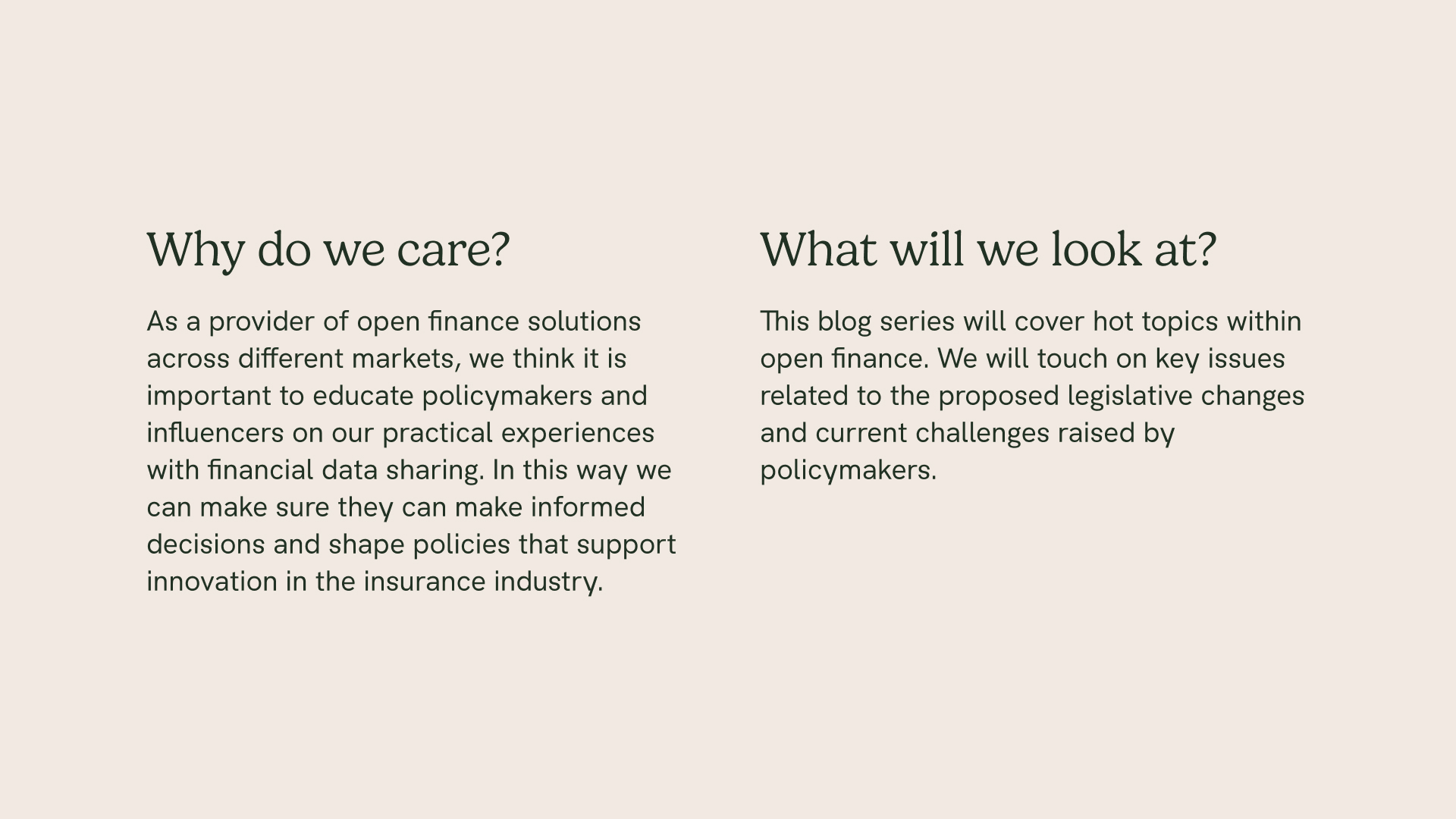
FIDA: Considerations on scope and definitions.
On 28 June 2023 the European Commission published its proposal on Financial Data Access (FIDA). Within its framework, FIDA regulates who gets access to financial data, what kind of data they can access and how data can be shared. In this blogpost we will dive into the most important considerations relating to the scope and the definitions as outlined in the FIDA proposal.
What is in the Commission proposal?
Scope and definitions set the foundations for the implementation of the FIDA Regulation, as well as the guidelines for the rest of the articles.
The scope of the FIDA proposal covers specific categories of customer data related to mortgage credit agreements, investments, pension rights, non-life insurance products - excluding sickness/health insurance, - and data, forming part of a firm’s creditworthiness assessment. The scope also includes the entities that fall in the scope of the Regulation, whether they function as data holders or data users, including various financial institutions, crypto-asset service providers, and insurance intermediaries.
It is apparent that the scope tries to cover a very broad range of categories and entities, excluding only data related to life, health and sickness insurance. We believe that even such data could be in the scope of FIDA, as we propose below.
The definitions have been kept broad and inclusive. The definition for ‘customer data’ is of particular importance, as this may define what kind of data should be collected, affecting the implementation of the rest of the articles of the proposal. Customer data is articulated as “personal and non-personal data that is collected, stored and otherwise processed by a financial institution as part of their normal course of business with customers which covers both data provided by a customer and data generated as a result of customer interaction with the financial institution”.

Why is it important to establish broader scope and definitions?
Overall, the Commission’s approach on the breadth of the scope is in the right direction. Here’s why:
- The broad scope paves the way for an equal and unrestricted access to customer data belonging to EU citizens, fostering an environment of data sharing without limitations or discrimination.
- The broad definition of customer data fosters innovation, whether it be for known use cases, or ones yet to be discovered.
- As a result of a wide scope of data sharing, innovations will be unlocked across many financial categories. This type of data sharing should cover all aspects of a citizen’s financial life, with the exclusion of life, sickness, and health insurance products.
- The current proposal also leaves the possibility to incorporate in the future these vital insurance products, (life, sickness, and health), within the FIDA framework, once it’s proven that data sharing is safe for the average European citizen.
Key points to keep the scope and definitions in the right direction:
- It is essential to maintain the broadest possible scope and definitions, in order to promote data accessibility and encourage innovation. A case can be made to exclude specific data points which may result in a data holder exposing data points considered intellectual property.
- It is critical to not water down the definition of customer data. It is important to ensure that all data which a citizen chooses to share with an institution, data which is generated about the product they have purchased (e.g. what have they purchased, when did they purchase it, when does it expire, how much are they paying for it, what are the fees), and data about how they have interacted with that product.
- Limiting the definition of customer data goes against GDPR principles. Citizens own and have a right to their data, and they should be able to share it, if they wish to do so.
- Unlocking consumer centric use cases will be needed for an overall better end-to-end experience for customers. These use cases rely on the current definition of customer data proposed.
- It will be important to avoid charging a customer for data they have a fundamental right to collect, as it would create a barrier for consumers and may remove any innovation that is not profit driven.
In a nutshell, by choosing a wide scope and comprehensive definitions, the FIDA proposal got it right, as this choice could be the key to achieving its target: to unlock innovations in the financial sector and work for the benefit of both the consumers and the enterprises.
If you want to to discuss this more, don't hesitate to reach out, we're always here to help.
